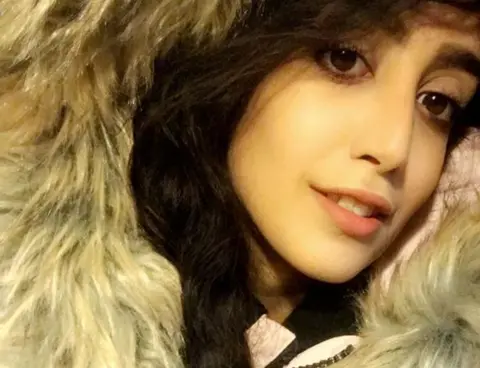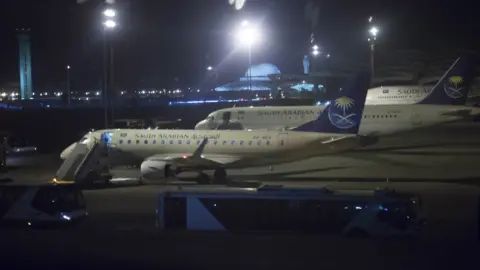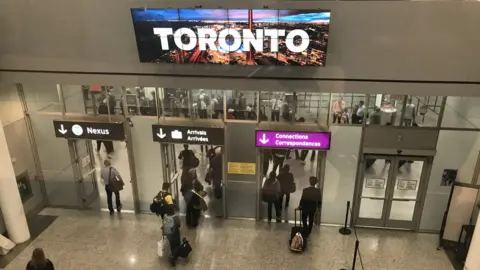Women's rights in Saudi Arabia: 'I escaped to seek a better life'
 Salwa
Salwa
It's a dramatic story that has brought the restrictions faced by women in Saudi Arabia back into the spotlight.
Rahaf Mohammed al-Qunun, 18, garnered global attention last week after she locked herself into her hotel room and refused to fly back home.
She was fleeing her family in Saudi Arabia and, after instigating a high-profile Twitter campaign, was granted asylum in Canada.
As the debate about women's rights in the country continues, another young woman who fled Saudi Arabia for Canada has told her story to the BBC.
Salwa, 24, ran away with her 19-year-old sister eight months ago and now lives in Montreal. This, in her own words, is her story.

The preparation
We had been planning to leave for roughly six years, but we needed a passport and a national ID card to do so.
I needed the consent of my guardian to get these documents. (Women in Saudi Arabia are required to obtain a male relative's approval for many things).
Fortunately, I had a national ID card already because my family agreed to give me one while I was studying at university.
I also had a passport because I needed one to sit an English language exam two years ago.
But my family took it away from me. Somehow, I needed to get it back.
I stole the keys to my brother's house and then went to the store to get a copy of them cut. I couldn't leave the house without their consent, but I sneaked out while they were sleeping.
It was very risky because if I had been caught then they would have hurt me.
Once I had the keys I managed to get hold of my passport, my sister's passport, and I also took my father's phone while he was sleeping.
Using this, I logged into his account on the interior ministry's website and changed his registered phone number to my number.
I also used his account to give us both consent to leave the country.
The escape
 Getty Images
Getty ImagesWe left at night while everyone was sleeping. It was very, very, stressful.
We can't drive so we called a taxi. Fortunately, almost all of the taxi drivers in Saudi Arabia are from foreign countries so they didn't view us travelling alone as strange.
We headed for King Khalid International Airport near Riyadh. If anyone had noticed what we were doing then I think we would have been killed.
For the last year of my education I was working in a hospital and saved up enough money to buy the plane tickets and a transit visa for Germany. I also had money from unemployment benefits that I had saved.
I managed to board the flight to Germany with my sister. It was the first time I had ever been on a plane and it was amazing. I felt happy, I felt fearful, I felt everything.
My father called the police when he realised we weren't at home, but by that time it was too late.
Because I had changed the phone number on his interior ministry account, when the authorities tried to call him they actually called me.
When I landed, I'd even received a message from the police that was meant for my father.
The arrival
There's no life in Saudi Arabia. I just went to the university then moved back home and did nothing all day.
They hurt me, and told me bad things like men are superior. I was forced to pray and fast at Ramadan as well.
When I arrived in Germany I went to legal aid to find a lawyer for my asylum claim. I filled out some forms and told them my story.
I chose Canada because it has a very good reputation for human rights. I followed the news about the Syrian refugees being resettled there and decided it was the best place for me.
My claim was accepted, and when I landed in Toronto I saw the Canadian flag at the airport and just felt this amazing sense of achievement.
 Getty Images
Getty ImagesI'm in Montreal today with my sister and there's no stress. No one forces me to do anything here.
They might have more money in Saudi Arabia but here it's better because when I want to leave my apartment I can just leave. I don't need consent. I just go outside.
It makes me feel really, really, happy. I feel like I am free. I just wear what I want to wear.
I love the colours in the autumn and the snow here. I'm learning French but it's so difficult! I'm also learning to ride a bicycle and I'm trying to learn how to swim and ice skate.
I feel like I'm actually doing something with my life.
I don't have any contact with my family, but I think that's good for me and for them. I feel like this is my home now. It's better here.
As told to the BBC's Gareth Evans and BBC OS on World Service radio.
